15 years one-stop China custom CNC machining parts factory
 797 |
Published by VMT at Aug 30 2024
797 |
Published by VMT at Aug 30 2024
Titanium alloys are indispensable materials in modern industries, known for their unique physical and chemical properties. This article provides a comprehensive introduction to the types, characteristics, applications, and machining techniques of titanium alloys, offering an in-depth guide for experts in CNC machining and parts manufacturing.
Titanium is a silver-colored transition metal with high strength, low density, and excellent corrosion resistance. It was first discovered by British mineralogist William Gregor in 1791 and named "Titanium" by German chemist Martin Heinrich Klaproth in 1795, after the Titans of Greek mythology. Although titanium is abundant in the Earth's crust, its extraction and processing are costly, making it an expensive material.
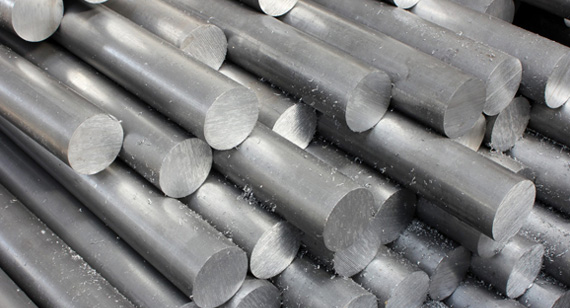
Despite its early discovery, titanium and its alloys were not widely used until the mid-20th century, following breakthroughs in smelting technology. Titanium alloys have since found significant applications in aerospace, chemical, medical, and other industries. China's titanium industry began in the 1950s, and after decades of development, it has become a vital player in the global titanium market.
Corrosion Resistance: Titanium alloys possess exceptional corrosion resistance, maintaining stable performance in harsh environments, making them ideal for chemical and marine engineering applications.
Lightweight: With a density of approximately 4.5g/cm³, titanium alloys are only 60% as dense as steel, making them key materials for lightweight design.
High Strength: Titanium alloys are much stronger than pure titanium, with some high-strength alloys offering tensile strengths exceeding 1100 MPa, making them ideal for manufacturing high-strength components.
Biocompatibility: Titanium alloys are well-tolerated by human tissues, causing no allergic or rejection reactions, making them common materials for medical implants.
Heat Resistance: Titanium alloys retain high strength and stability at elevated temperatures, making them ideal for high-temperature components such as aerospace engines and rockets.
Non-Magnetic: Titanium alloys are non-magnetic, suitable for applications sensitive to magnetism.
Ductility: Titanium alloys have good ductility, allowing them to be machined into various shapes and sizes.
Low Thermal Expansion: Titanium alloys exhibit low thermal expansion, helping maintain dimensional stability in parts.
Excellent Fatigue Resistance: Titanium alloys exhibit outstanding fatigue resistance under alternating stress, making them suitable for components subjected to cyclic loads.
Titanium alloys can be categorized into Alpha (α) alloys, near Alpha (α+β) alloys, Beta (β), and near Beta alloys based on their structure. Each type of titanium alloy has distinct phase compositions and microstructures, leading to varied performance characteristics.
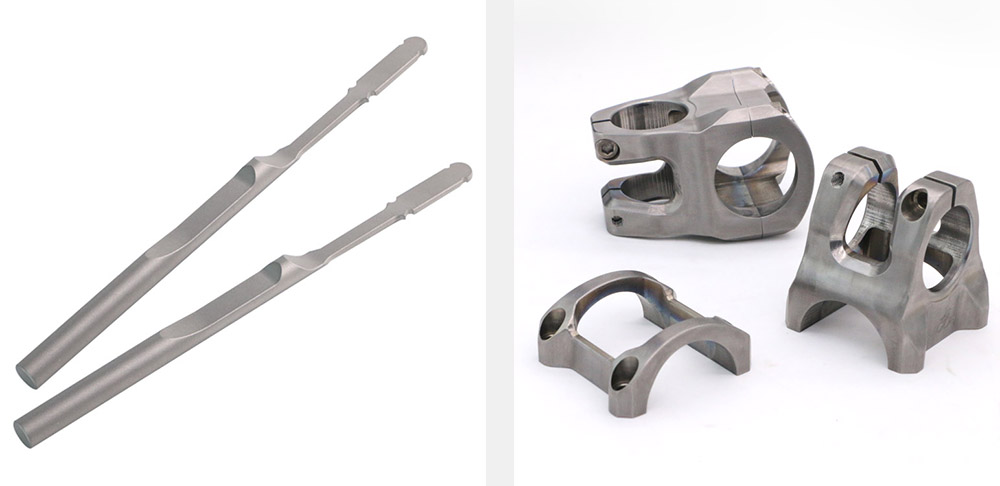
Alpha Alloys: Composed primarily of α-phase solid solutions, Alpha alloys are stable, wear-resistant, and oxidation-resistant. However, they have low room temperature strength and cannot be strengthened through heat treatment.
Near Alpha Alloys: Near Alpha alloys (α+β alloys) contain a certain amount of β-phase, allowing the proportion of α and β phases to be adjusted through heat treatment for optimal comprehensive performance. These alloys are easy to machine and widely used in aerospace and other fields.
Beta and Near Beta Alloys: Beta alloys are composed mainly of β-phase solid solutions, with high strength even without heat treatment, and further strength enhancement through quenching and aging. However, they have poor thermal stability and are unsuitable for high-temperature applications. Near Beta alloys improve the stability of the β-phase by adding small amounts of alloying elements, enhancing the alloy's overall performance.
Alpha and Beta Alloys: These alloys contain both α and β phases, allowing precise control of the proportions and distribution through heat treatment to achieve specific performance combinations. These alloys have broad application prospects in aerospace, chemical, and other industries.
Titanium alloys can be classified by strength into low-strength, moderate-strength, high-strength, and ultra-high-strength types. Different types of titanium alloys are suitable for various applications and performance requirements.
Low Strength: Low-strength titanium alloys are mainly used in applications requiring high corrosion resistance, such as chemical equipment and marine engineering. These alloys have good formability and weldability but relatively low strength.
Moderate Strength: Moderate-strength titanium alloys have tensile strengths between 500 MPa and 900 MPa, suitable for medium-load components. These alloys offer good comprehensive properties, such as Ti-6Al-4V (TC4), a typical moderate-strength titanium alloy.
High Strength: High-strength titanium alloys have tensile strengths exceeding 1100 MPa, primarily used for high-load components like aircraft structural parts and engine components. These alloys usually consist of near-β titanium alloys and metastable β titanium alloys, such as Ti-13V-11Cr-3Al.
Ultra-High Strength: Some titanium alloys, through special heat treatment processes and alloying design, can achieve extremely high strength, meeting the requirements of extreme conditions. These alloys are valuable in aerospace, military, and other fields.
Titanium alloys are available in various grades, each with unique characteristics and applications. The following provides a detailed introduction to some common titanium alloy grades and their characteristics and applications.
Grade 1 Titanium Alloy: Grade 1 titanium alloy usually refers to commercially pure titanium, which has excellent corrosion resistance and formability but low strength. These alloys are mainly used for parts requiring good corrosion resistance but low strength, such as chemical equipment and seawater desalination plants.
Grade 2 Titanium Alloy: Grade 2 titanium alloy typically refers to α-type titanium alloys, which have good low-temperature toughness and weldability, suitable for low-temperature pressure vessels, liquid oxygen tanks, and other applications. These alloys maintain good strength and toughness even at low temperatures, making them ideal materials for low-temperature engineering.
Grade 4 Titanium Alloy: Grade 4 titanium alloy is a medium-strength α+β titanium alloy with excellent creep resistance and high-temperature endurance strength, widely used in high-temperature components of aerospace engines and gas turbines. Ti-6Al-4V (TC4) is the most representative Grade 4 titanium alloy and is also the most widely used titanium alloy today.
Grade 5 Titanium Alloy or Ti 6Al-4V: Ti 6Al-4V (TC4) is widely used in aerospace, marine, chemical, and medical fields due to its high strength, good thermal stability, and corrosion resistance. It is the representative of medium-strength titanium alloys and a preferred material in many high-end manufacturing fields.
Grade 6 Titanium Alloy or Ti 5Al-2.5Sn: Ti 5Al-2.5Sn is an α-type titanium alloy with good high-temperature performance and thermal stability, mainly used in high-temperature components of aerospace engines, such as compressor disks and blades. This alloy maintains high strength and excellent creep resistance at elevated temperatures.
Grade 7 Titanium Alloy: Grade 7 titanium alloys are primarily β-type or metastable β-type titanium alloys, which can achieve high strength and good comprehensive properties through heat treatment. These alloys are suitable for manufacturing high-strength, high-corrosion-resistance components, such as rocket engine casings and missile components.
Grade 11 Titanium Alloy: Grade 11 titanium alloy exhibits excellent oxidation resistance and high-temperature strength, particularly suitable for components working in high-temperature environments, such as thermal protection systems for spacecraft.
Grade 12 Titanium Alloy or Ti 0.3-Mo 0.8-Ni: This is a titanium alloy for special purposes, with excellent corrosion resistance and good mechanical properties, suitable for manufacturing parts working in corrosive media such as seawater desalination systems and marine engineering.
Grade 23 Titanium Alloy or Ti 6Al-4V ELI: Ti 6Al-4V ELI (Extra Low Interstitial) is an improved version of Ti 6Al-4V, optimized by reducing interstitial elements to enhance corrosion resistance and biocompatibility. It is widely used in medical implants and other fields.
With the rapid development of 3D printing technology, titanium alloys have become important materials for additive manufacturing. Ti 6Al-4V is the most commonly used titanium alloy grade in 3D printing, with excellent mechanical properties and machinability, making it widely applicable in aerospace, medical, automotive, and other fields. Additionally, other titanium alloys such as Ti-5Al-2.5Sn and Ti-6Al-7Nb are also used in 3D printing to some extent.
Resistivity: Titanium alloys have relatively low resistivity, meaning they generate less heat when current flows through them, which is beneficial for the stable operation of electrical equipment.
Thermal Conductivity: Titanium alloys have moderate thermal conductivity, balancing heat stability and efficient heat transfer, suitable for various working environments.
Density: The density of titanium alloys is much lower than that of steel and nickel-based alloys, making them key materials for lightweight design.
Strength: The strength of titanium alloys varies with grade and application but is generally higher than that of most metallic materials. High-strength titanium alloys, in particular, far exceed the strength of ordinary steels.
Color: Titanium alloys typically have a silver-white color with a metallic luster and good aesthetic appeal.
Ductility:Titanium alloys have good ductility, allowing them to be formed into various shapes and sizes while maintaining strength and integrity, making them ideal for a wide range of applications in industries requiring both high performance and flexibility.
Durability: Titanium alloys exhibit excellent corrosion resistance and fatigue strength, allowing them to be used in harsh environments for extended periods without significant degradation.
Oxidation Potential
Titanium has a high oxidation potential, which allows it to easily form a dense oxide layer on its surface, protecting the base material from corrosion.
Alloy Formation Capability
Titanium has a good affinity with various elements, enabling it to form a wide range of alloys to meet different performance requirements.
Reactivity
Titanium is relatively stable at room temperature but may react chemically at high temperatures or when in contact with other reactive elements.
Corrosion Resistance
The corrosion resistance of titanium alloys is mainly due to the oxide film formed on their surface and the protective effect of alloying elements on the base material.
High Strength
The high strength of titanium alloys makes them ideal for manufacturing high-strength, lightweight components.
Corrosion Resistance
Titanium alloys maintain good performance stability in various corrosive media, reducing maintenance costs and usage risks.
Biocompatibility
Titanium alloys have good biocompatibility with human tissue and do not cause rejection reactions, making them indispensable in the medical field, particularly as materials for orthopedic implants (such as artificial joints, bone screws, dental implants) and cardiovascular implants (such as pacemaker casings and vascular stents).
High Melting Point
The high melting point of titanium alloys allows them to remain stable in high-temperature environments, which is particularly important in fields like aerospace, where components must withstand extreme heat.
Various Manufacturing Methods
Titanium alloys can be processed using a variety of manufacturing techniques such as casting, forging, rolling, welding, and 3D printing, meeting the requirements for components of different shapes, sizes, and performance characteristics.
Reactivity at High Temperatures
At high temperatures, titanium alloys may react chemically with certain elements or gases, leading to performance degradation or surface contamination.
High Cost
The extraction and processing costs of titanium alloys are relatively high, making them more expensive than other metal materials, which limits their widespread application to some extent.
Difficult to Process
Titanium alloys have high hardness and toughness, making them challenging to process, as they tend to cause tool wear, high cutting forces, and difficulty in controlling the surface quality during machining.
Low Creep Resistance
Some titanium alloys may exhibit creep under high temperatures and prolonged load conditions, leading to dimensional changes and affecting the performance and lifespan of components.
Titanium alloys are challenging to process for the following reasons:
High Hardness: Titanium alloys have higher hardness than ordinary steel, causing rapid tool wear and low machining efficiency during cutting.
Thermal Conductivity: Although the thermal conductivity of titanium alloys is moderate, the heat generated during cutting is not easily dissipated, leading to increased temperature in the cutting area, accelerating tool wear, and potentially affecting the material's performance.
Low Elastic Modulus: Titanium alloys have a low elastic modulus, causing the workpiece to rebound during cutting, which affects machining accuracy.
Chemical Activity: Titanium alloys are prone to reacting with oxygen, nitrogen, and other gases in the air at high temperatures, forming hard compounds and increasing cutting difficulty.
Use the Right Tools and Equipment
Select cutting tools with high hardness and wear resistance suitable for titanium alloy machining, such as carbide, ceramic, or cubic boron nitride (CBN) tools. Also, adopt reasonable tool geometry and cutting parameters, such as lower cutting speeds, higher feed rates, and shallower cutting depths, to reduce cutting forces and tool wear.
Conduct Heat to Chips
Optimize the use of cutting fluids by improving their cooling performance and flushing effect to quickly remove the heat generated during cutting, reducing the temperature in the cutting area and protecting both the tool and the workpiece.
Increase Coolant Concentration and Pressure
Use high-concentration, high-pressure coolant during machining to enhance cooling effects, reduce thermal deformation during cutting, and minimize tool wear.
Avoid Wear
Regularly check for tool wear and replace severely worn tools in time. Additionally, adopt reasonable cutting parameters and tool path planning to avoid excessive impact and load on the tools during machining.
Aerospace Industry
Titanium alloys play a crucial role in the aerospace industry, used in manufacturing key components such as aircraft fuselages, engine parts, and landing gear, to enhance aircraft performance, reduce weight, and extend service life.
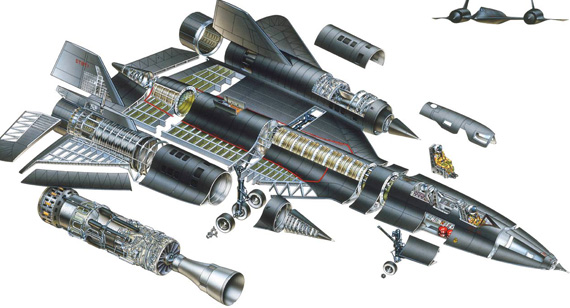
Titanium alloys are increasingly used in the medical field, mainly for making various implants, surgical instruments, and auxiliary devices to meet the specific needs of the medical industry.
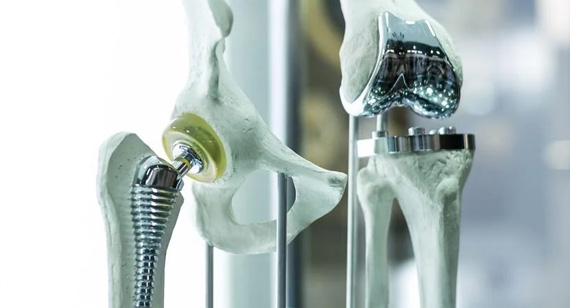
In the electronics industry, titanium alloys are primarily used to manufacture high-performance electronic components and heat dissipation parts, improving the stability and reliability of electronic devices.
Jewelry Industry
Due to their light weight, strength, and corrosion resistance, titanium alloys are also used to create high-end jewelry, such as rings and necklaces.
Industrial Sector
In the industrial sector, titanium alloys are widely used in chemical, petroleum, power, and other industries for equipment manufacturing, to enhance the corrosion resistance and service life of equipment.
Construction Industry
As building technology advances, titanium alloys are also making their mark in the construction industry, used in the manufacture of decorative materials and structural components for high-end buildings.
In the automotive industry, titanium alloys are mainly used to manufacture high-performance engine parts, chassis components, and body structures, to improve vehicle performance and fuel efficiency.
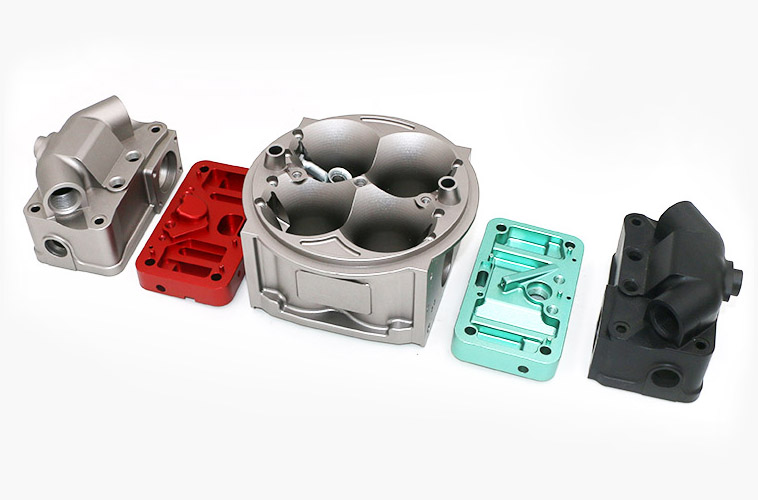
Chemical Machining
Titanium alloys are mainly used in the chemical processing field to manufacture corrosion-resistant reactors, pipelines, and valves to meet the specific requirements of the chemical industry.
Composite Materials
Titanium alloys can also be combined with carbon fiber and other composite materials to form superior composite products, such as aircraft wings and ship hulls.
Titanium alloys, as a special metal material with excellent performance, play an increasingly important role in modern industry. By understanding the types, characteristics, processing techniques, and applications of titanium alloys, we can better utilize this material to drive the development and innovation of the manufacturing industry. VMT, as a professional CNC machining service provider, is committed to offering high-quality titanium alloy CNC machined parts and custom CNC machining services to meet diverse customer needs.
What Is the Strongest Titanium Alloy?
Ti185 titanium alloy is considered one of the hardest titanium alloys in the world, with a hardness of up to 440HV, making it ten times harder than general titanium alloys. This alloy, composed of titanium, aluminum, vanadium, niobium, chromium, and other metals, is widely used in high-strength industrial fields like cutting tools and turbine blades.
Which Is Better: Grade 2 Titanium or Grade 5 Titanium?
There is no absolute answer to this question, as Grade 2 and Grade 5 titanium each have their advantages and application areas.
Grade 2 Titanium Alloy: Typically has better low-temperature toughness and weldability, suitable for applications requiring high low-temperature performance, such as cryogenic pressure vessels and liquid oxygen storage tanks.
Grade 5 Titanium Alloy (e.g., Ti-6Al-4V): Offers high strength, good thermal stability, and corrosion resistance, widely used in aerospace, medical, and other fields, particularly for parts or components that need to withstand high mechanical loads.
Therefore, the choice between these titanium alloys depends on specific application requirements and performance needs.
Why Is Grade 5 Titanium So Expensive?
Grade 5 titanium alloy is expensive mainly due to the following reasons:
Difficult to Process: The processing of titanium alloys, especially Grade 5, requires high equipment and process requirements due to its high strength and hardness, leading to rapid tool wear, high cutting forces, and increased machining costs.
Complex Smelting: The smelting of titanium alloys requires high temperatures and stringent smelting environments, such as vacuum environments or inert gas protection, to avoid reactions with other substances. This increases the complexity and cost of smelting.
Rare Metal Elements: Grade 5 titanium alloy usually contains rare metal elements like aluminum and vanadium, which are relatively expensive.
Widespread Application: Due to its excellent performance, Grade 5 titanium alloy is widely used in high-end fields such as aerospace and medical industries, with high market demand, further driving up its price.
What Is the Weakest Titanium?
In the classification of titanium alloys, there is no direct definition of "the weakest titanium." However, in terms of pure titanium, Grade 1 titanium (composed of pure, unalloyed titanium) might be considered relatively weaker due to its lower strength. However, even Grade 1 titanium is highly regarded in the medical field for its excellent formability, corrosion resistance, and impact resistance.
What Is the Most Heat-Resistant Titanium Alloy?
Heat-resistant titanium alloys, also known as high-temperature titanium alloys, can work in high-temperature environments while maintaining high strength and stability. The specific heat resistance of a titanium alloy depends on its composition and the temperature range of use. For example, the IMI-834 alloy (Ti-6Al-4.5Sn-4Zr-1Nb-0.5Mo-0.4Si-0.02Fe) can be used at temperatures up to 600°C, making it one of the titanium alloys known for excellent high-temperature performance.
What Is the Difference Between Grade 2 and Grade 4 Titanium?
Grade 2 and Grade 4 titanium are both unalloyed titanium grades, with the main differences in strength, corrosion resistance, and formability.
Grade 2 Titanium: A non-alloyed form of titanium that is medium strength, corrosion-resistant, and highly formable. It’s often used in applications like chemical processing, heat exchangers, and desalination plants.
Grade 4 Titanium: Offers the highest strength among the commercially pure titanium grades, with slightly lower formability compared to Grade 2. Grade 4 titanium is often used in applications requiring a balance of high strength and corrosion resistance, such as in medical implants and industrial components.
Why Is Titanium Not Used in Guns?
Titanium is not commonly used in guns for several reasons:
Cost: Titanium is expensive, making it less cost-effective for mass production of firearms.
Brittleness: Although titanium is strong and lightweight, it is relatively brittle, especially in high-stress applications like gun barrels and frames, where ductility and toughness are crucial.
Machining Difficulty: Titanium is difficult to machine, leading to higher production costs and challenges in creating precise components.
Material Compatibility: The brittleness and reactivity of titanium may also cause compatibility issues with other materials, leading to potential performance and safety concerns.
Why Is Titanium Not Used More Often?
Although titanium has many advantages, its widespread use is limited due to several factors:
High Cost: Titanium is expensive to extract, process, and manufacture, which limits its application in cost-sensitive industries.
Difficult Processing: Titanium is challenging to process due to its high hardness and toughness, leading to increased manufacturing costs and difficulties in obtaining high-quality surface finishes.
High Chemical Reactivity: At high temperatures, titanium can react with oxygen, nitrogen, and other elements, leading to embrittlement and performance degradation.
Low Availability: Although titanium is abundant, the technology for its extraction and processing is complex, resulting in limited supply and high prices.
Why Are Titanium Engines Used in Aircraft?
Titanium alloys are used in aircraft engines mainly for the following reasons:
Light Weight: Titanium alloys are much lighter than traditional metals like steel, reducing aircraft weight and improving fuel efficiency.
High Strength: Titanium alloys offer high strength-to-weight ratios, making them ideal for critical structural components in aircraft engines.
Heat Resistance: Titanium alloys maintain good mechanical properties at high temperatures, making them suitable for components in high-temperature areas of aircraft engines, such as turbine blades and compressor discs.
Corrosion Resistance: Titanium alloys resist corrosion in harsh environments, such as high-temperature, high-pressure, and humid conditions, improving the reliability and lifespan of engine components.
Why Titanium Is Used in Hip Replacements?
Titanium is used in hip replacements mainly due to its excellent biocompatibility, strength, corrosion resistance, and ability to integrate with bone tissue. The lightweight nature of titanium also contributes to faster recovery and reduced risk of post-surgery complications.
What is the Difference Between Grade 5 and Grade 23 Titanium?
Grade 5 titanium alloy (e.g., Ti-6Al-4V) is a widely used titanium alloy known for its high strength, good thermal stability, and excellent corrosion resistance. Grade 23 titanium, also known as Extra Low Interstitials (ELI) titanium alloy, is a version of Grade 5 titanium with a further reduction in the content of impurities such as oxygen, nitrogen, and carbon. This reduction in impurities results in higher purity, improved toughness, and enhanced corrosion resistance in Grade 23 titanium. Due to these qualities, Grade 23 titanium is often used in fields that demand extremely high material purity and performance, such as in high-end watches and medical implants.
Which Titanium Alloy Has the Highest Yield Strength?
Ti185 titanium alloy, with its exceptionally high hardness (440HV) and unique alloy composition, potentially has a relatively high yield strength. However, the exact yield strength value depends on the specific alloy grade and the heat treatment condition. Different types of titanium alloys can undergo various heat treatments or processing to further increase their yield strength, depending on specific design and application needs. Therefore, it is not possible to definitively state which titanium alloy has the highest yield strength without considering these factors.
